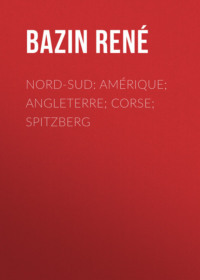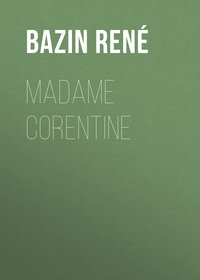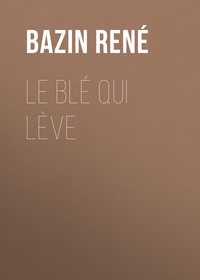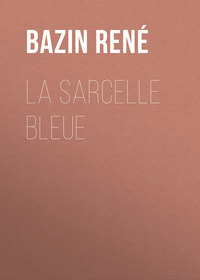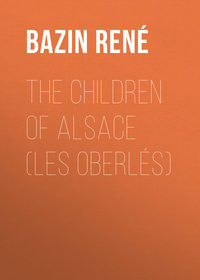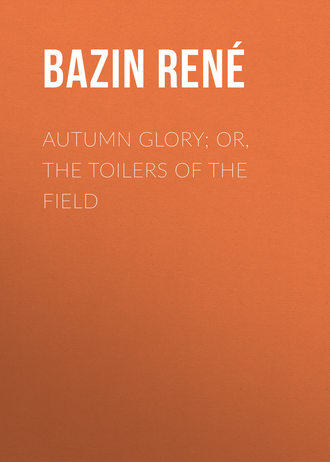 полная версия
полная версияAutumn Glory; Or, The Toilers of the Field
In the evening when André returned from work in whom should he confide, or who was there to comfort him? His mother was dead; his father had need of all his own hope and buoyancy of spirit that he might not break down himself; Mathurin was so uncertain and so soured that pity might well go out to him, but not real brotherly love. There remained Rousille, possibly. But Rousille was seventeen when André had left home, and he continued to treat her as a child, and told her nothing. Besides she was scarcely ever to be seen, poor girl, always on the run and hurried. The house was dull, and the young man felt it the more that regimental life, hard enough in all conscience, was yet full of go and movement.
Weeks went by, and there was no break in the sadness. Weary of being thus thrown upon himself, little by little André suffered his thoughts to go out from the mournful surroundings amid which he, in vain, tried to recognise the home of his youth. Like all peasants of the coast, he was one of those taciturn labourers who look over the sand-hills towards the sea, and who dream dreams when the wind blows. Sad and dejected he fell back upon the fatal knowledge he had acquired in absence: that life was possible in other places than at La Fromentière on the borders of the Marais of La Vendée.
The temptation grew stronger. Two months after having re-taken possession of the room that the two brothers had formerly shared together, one night, when the other inmates of the farm were sound asleep, André began a letter to a comrade in the foreign legion, whom he had known in Africa. "I find it too dull here. My brother and sister have left home. If you happen to know of any good investment in land in Algiers, or elsewhere, let me know. I have not come to any decision, but I am thinking of going away. I am, as it were, alone here." And answers soon came. To the great astonishment of Toussaint Lumineau the postman began bringing pamphlets, papers, and prospectuses to La Fromentière, over which André did not make merry as did Rousille and Mathurin. Laughingly his father, who had no suspicion of André, said:
"There has never been such a supply of paper at La Fromentière, Driot, as in the few weeks since you have been home. I don't grudge it you, reading is such a hobby of yours! As for me, I should be tired to death with all the printed stuff."
Only on Sundays the old father suffered a little from his son's passion for reading and writing. On that day after vespers it was his habit to bring back some old friend, either Le Glorieux de la Terre-Aymont, or Pipet de la Pinçonnière to pay a visit of inspection round the farm fields. Up hill and down dale they would go in single file, examining everything, expressing approval or disapproval by uplifted eye or shrug of the shoulder, exchanging an occasional word that had always the same object: the harvest, present or future, good or indifferent, threatened or gathered in. In this winter season it was the fields, the young wheat, and patches of lucerne that were under consideration; and Toussaint Lumineau, who had not succeeded in getting André to accompany them, would confide to his neighbour of La Terre-Aymont, or La Pinçonnière as they stopped where the slanting rays of the sun fell on the corner of a field:
"My son André is quite different from anyone I have ever known, and not a bit like we used to be. Not that he despises the land, on the contrary, he loves it, and I have no fault to find with his work all the week. But since he came home from the regiment, his one idea on Sunday is reading."
Rousille, too, was sometimes surprised. She had too much to do indoors to occupy herself with the work or amusements of the others. Busy with housekeeping, and the thousand and one duties of the farmyard, she never saw André save at meal-times, and in presence of the others. At those times, whether by an effort of will, or that youth obtained the mastery over depression, André was usually in gay and careless spirits, bantering Rousille and trying to make her laugh. But as a woman and one who had suffered, Rousille had learned to discern the sorrows of others; and from many a little sign, eyes fixed on the upper window, words dropped that might bear some other meaning, her loving heart had divined that André was not altogether happy; without knowing more, she felt sorry for him. But even she was far from guessing the crisis through which her brother was passing, or the project he was meditating.
One solitary member of the family had penetrated the designs of André, and that was Mathurin. He had observed his brother's increasing sadness; the useless efforts he was making to regain his former equability of temper; his calm fortitude in daily labour. Sometimes he would follow him into the fields, then watch for the arrival of the postman and take charge of the letters and papers addressed to André. The smallest details remained engraven on his brooding memory; and one day, under the guise of indifference, with a skilfully put question his brooding took shape. He was aware that the greater number of the letters received by André bore the stamp either of Algiers or Antwerp, and the latter place conveying nothing to Mathurin, André had explained:
"It is a large port in Belgium, larger than Nantes that you once passed through."
"How do you come to know anyone living so far from here and far from Algiers?"
"It's very simple," replied his brother. "My best friend in Algiers is a Belgian in the foreign legion, whose family live in Antwerp. Sometimes I hear from Demolder, sometimes from his people, who write to give me the information I want."
"News of old comrades, then?"
"No, things that interest me in the matter of voyages, other countries… One of the sons has settled across the sea, in America. He has a farm as large as this whole parish."
"Was he rich?"
"No. He is now."
Mathurin did not further press the subject, but he continued to observe, to add indication on indication. If André chanced to leave a pamphlet on emigration lying about, or an advertisement of land to be let or sold, taking it up Mathurin would seek to discover the places over which his brother's brows had met in a frown, or where something like a smile, a wish, a desire had lighted up his eyes.
By proof on proof he had arrived at the conviction that Driot was thinking of leaving La Fromentière. When? For what remote land where money was easily made? Those were the problems. Thus in the month of December, when opportunities for confidential chat are more frequent by reason of days of snow and rain and squall, when alone with André in the stables or the house, he would say treacherously:
"Tell me about Africa, Driot. Tell me some yarns of men who have made money out there. I like to hear such things." Or at other times he would say: "La Fromentière must seem small and insignificant to a fellow like you who read so much. It certainly is not as productive as it used to be."
Mathurin had settled coming events in his mind, while Driot was still in doubt.
So the year drew to a close, and the new year began. It was a wet winter, with hard frost at nights; every morning spiders' webs covered with frozen mist would wave in the breeze like white wings, the damp earth would steam in the mid-day sun, and the white wings turn grey. The main work of the fields was suspended; the owners of land on high ground felled trees, or re-made fences; those on the Marais were perforce reduced to idleness; it was holiday-time with them; dykes and ditches were overflowing. The greater number of the farms surrounded by water, and, as it were, floating above it, were cut off from all communication with the neighbouring towns or each other save by boats steered over the inundated meadows. It was the time for dancing and shooting.
The ground, however, was not too hard to work upon, and, following Mathurin's advice, Toussaint Lumineau resolved to dig up his vineyard attacked by phylloxera.
So one morning the farmer and André made their way up to the little field lying well exposed to the south on the high ground which cuts the road between Chalons and La Fromentière. Before them they saw nothing but seven rows of vine enclosed by furze hedges, stony ground, and the revolving sails of two wind-mills.
"You begin on one row," said the farmer, "I will take the next," and pulling off their coats, despite the cold, for it meant hard work, they began on their task. Coming up the hill they had talked cheerily to each other; but no sooner did they begin to dig than their spirits sank, and they grew silent, not wanting to impart the thoughts that the work of destruction engendered. If a root, perchance, made very tough resistance, the father once or twice attempted to joke, saying playfully: "It felt quite comfortable there, and did not want to be turned out," or something else to that effect. But he soon gave up the attempt. He could not succeed in banishing from his mind, nor from that of the son working beside him, sad thoughts of the time when the vine prospered, and yielded abundantly the white foaming wine they had drunk so merrily in the old happy days of fêtes and gatherings. The contrast of his former prosperity with present hard times fretted him; and as far as he could see, it weighed still more upon the spirits of his Driot.
Thus, in silence, they plied their huge, old-fashioned pickaxes, made to be wielded by giants. The earth flew in showers; the trunks trembled; some few shrivelled leaves left upon the branches fell, and were blown about in the wind with a noise as of broken glass; now the stem was disclosed, vigorous but warped, covered with green moss, the effects of many a summer dew and rain, and tapering off to the size of a tendril. The marks of pruning made by successive vinedressers were not to be numbered; no one could tell the age of the vineyard. Every year since he could remember anything, Driot had pruned it, dressed it, gathered its grapes, drunk of its juice. And now it was dying. Each time that he gave the final blow to a root he felt a pang; each time that, seizing a portion of the lifeless fibres he threw it on the heap of dead uprooted stems, he shrugged his shoulders with mingled sorrow and rage. Dead those veins through which the red, joyous sap was wont to rise. Dead the fertile branches once bending under the weight of bunches of grapes, until they rested a golden glory on the ground! Never again would the flowerets, pale stars with drops of honey in each centre, attract the summer gnats, nor diffuse their mignonette-like perfume far over the fields, even to La Fromentière. Never again would the children of the farmstead push eager hands through the gaps in the hedge to clutch the bunches within reach! Never again would the women carry away basketfuls at vintage time. For many a long day wine would be scarce at the farm, and would be no more of "our own growing." Something belonging to the family, an hereditary and sacred possession seemed to perish with the vineyard, old and faithful servant of the Lumineaus. Father and son were both so intensely penetrated by the sense of their loss, that, as night descended, and the father raised his pickaxe for a final stroke, he could not help exclaiming:
"It's a hateful work, Driot, we have done to-day."
All the same, there was a difference between the sadness of father and son. Toussaint Lumineau, as he rooted up the vines, was already thinking of the day when he would plant fresh ones, and in his silent musings had seen his successor gathering in the vintage and drinking the muscadet of the new vineyard. He possessed that love, strong and tried, which rises hopefully after every stroke of misfortune. With André hope did not speak, because with him love had waxed feeble.
The two men, their figures indistinct in the darkening day, turned to skirt the grassy edge of the vineyard, then descended the sloping fields that led towards the farm. With weary, stooping frame, shouldering their heavy implements, they looked across the Marais to the crimson horizon, and at the clouds driven by the wind towards the setting sun. It was a melancholy evening; all around them were furze-bushes, ground uncultivated, hedges devastated, leafless trees, the gloom and chill of autumn. Thus they had gone some two hundred yards before the son could make up his mind to speak, as though feeling that his reply would be too hard for the father, who lived on in the same old groove.
"Yes," he said, "the day of the vine is at an end in our land, but it flourishes elsewhere."
"Where, my Driot?"
In the half dark the son extended his disengaged hand above La Fromentière, sunk below in the shadows; and the action extended so far, away over the Marais and over La Vendée, that through his stout woollen garments Toussaint Lumineau felt the keen blast of the wind.
"What do other countries matter to us, my Driot," said he, "seeing that we are living in our own?"
Did the son understand the anxious tenderness of the words? He answered:
"Because in ours it becomes more and more difficult to live."
Toussaint Lumineau remembered words, almost similar, spoken by François and was silent, trying to explain to himself how it was that André, who was neither lazy nor a frequenter of town pleasures, could have fallen upon the very same way of thought. As the men, skirting the brown fields, came nearer home, La Fromentière with its masses of trees rose like a dome of denser darkness, above which the winter night was lighting its first stars. The farmer never entered the beloved precincts of his home without emotion; to-night, more than ever, he experienced its sweetness, dear to him as any bridal promise.
Rousille, hearing their approaching footsteps, opened the door, and raised the lamp high in air, like a signal.
"You are late to-night," she said.
Before they could make reply, the long-drawn sound of a horn was heard coming from the depths of the Marais, beyond Sallertaine.
"It is the horn of La Seulière," cried the voice of Mathurin from within. The two men, followed by Rousille, entered the warm room with its blazing hearth.
Mathurin resumed:
"There's a dance at La Seulière to-night. Will you come, Driot?"
The cripple, half-rising, supporting himself by his arms against the table with a nervous movement, his eyes glaring with long-suppressed desire, was alike painful to see, and fear-inspiring, as one whose reason was tottering.
"I am not much in the mood for dancing," returned André carelessly, "but it may do me good to-night."
Silently the farmer pressed his hand on the shoulder of his afflicted eldest son, and the fevered eyes relaxed their stare, the body obeyed, and fell back upon the bench like a sack of wheat that expands as it touches the ground. The men ate their supper hurriedly; towards the end of the meal Toussaint Lumineau, whose mind had reverted to André's words, wishing to take those of his children to witness whose hearts had never swerved in their loyal love to La Fromentière, said:
"Would you believe, Mathurin, what foolish stuff this Driot was talking to-night? He declares that vines have had their day with us; that they flourish better elsewhere. But when one plants a vine, one expects it to die some day, does one not?"
"Many enough have died before ours," responded the cripple roughly. "We are not more unlucky than our neighbours."
"That is just what I say," put in André, and he raised his head. His eyes were lit by a spirit of contradiction, and his silky moustache quivered as he spoke. "It is not our vineyard alone that is played out, it is the soil; ours, our neighbours', that of the whole country, as far and further than you have ever been. One must have new land to produce good results."
"New land?" returned his father. "I know none about here. It is all cultivated."
"Ah, but there is in many a country." He hesitated an instant, then enumerated hurriedly: "In America, the Cape, Australia, British possessions – everything flourishes in those countries. There the earth is prolific; while here – "
"Don't speak ill of it, Driot; it is worth the very best!"
"Used up; too dear!"
"Too dear, yes, somewhat. But feed it well, and you will see!"
"Feed it then. You have nothing to buy the stuff with."
"Only come a good year, not too dry, not too wet, and we shall have money enough!"
The farmer had drawn himself up, as if under a personal insult, and now awaited Driot's answer.
He, carried away by passion, rose. Everyone looked at him, even the farm-servant, who, with chin sunk in his horny hand, was trying to understand the situation. And there was something in the fluency of words, ease of gesture that made all vaguely feel that André was no longer like one of themselves.
"Yes," said the youth, proud of an audience, "there might still be some work to be done here, in the old country; but we are taught nothing of such things in our schools; that would be too practical. Then taxes are too heavy, and rents too high; and all the time that we are leading a miserable existence, they out yonder are having magnificent harvests. That I hear every day. Our vineyards are ruined, and they have wine. Wheat grows without their having to dress the land, and they export it to us in shiploads as full as, from what you say, the granaries of the old Château used to be – "
"Cock and bull stories! You have read them in books."
"Some of them; but I have seen ships in port, and sacks of wheat being unloaded like the water of a dyke overflowing its banks. If you were to read the papers, you would know that everything now comes to us from abroad far cheaper than we can produce it ourselves: corn, oats, horses, oxen; and that we have competing with us Americans, Australians, and soon we shall have Japanese, Chinese – " he was intoxicated with words; he was but the echo of the few pamphlets he had read, or of what he had heard from others. La Fromentière heard him with stupor. China, Japan, America, the names circled round the room like some unknown variety of bird, brought by the tempest from far-off regions. The farmhouse walls had heard many uncouth peasant sounds, but never had they resounded under the shock of these foreign words.
Astonishment was marked upon the faces that, in the light of the lamp, were turned upon Driot, who continued:
"I have learnt things, I can assure you! I learn more every day. And, look you, when one comes home as I have done to-night, from rooting up a vineyard, it makes one savage to think that there are parts of America, and I could give you the names, where one can settle without opening one's purse – "
"You be off!" quoth the ploughman.
"Yes! Government gives the agriculturist his passage free; keeps him when he first lands; and gives him a ranch of seventy-four acres of land."
This time the farmer shook his head, scandalised at the enormity of his son's statement, and said in a tone of disapprobation:
"You are telling up a parcel of lies, my boy. Seventy-four acres, that makes two hundred and ninety-six roods. I am not much of a reader, it is true, but I do not let myself be crammed with all the stuff you believe in like the Gospel. Two hundred and ninety-six roods. Governments would soon be ruined if they made a present like that to everyone who wanted it… Hold your tongue… It vexes me to hear our native land talked ill of. Since you want to cultivate it with me, Driot, do as we do, and don't talk ill of it… It has always supported us."
There ensued an embarrassed silence, of which the farm-servant took advantage to get up, and betake himself to bed.
The call from La Seulière sounded out again in the still night. Mathurin said no word, but looked at his brother; he, ill at ease, excited by the recent discussion, understood the mute question, and answered promptly, in a manner that should show that he was free to do as he chose:
"Very well. Yes, I am going."
"I will go with you as far as the boat," responded the cripple.
Toussaint Lumineau foresaw danger.
"It is bad enough that your brother should be going to La Seulière," said he. "But for you, my poor boy, on no account would it do to go to their dance. It is cold out of doors. Do not go further than the duck meadow, and come back quickly." He followed with his eyes the cripple, who, in great haste, with the unnatural energy given him by emotion, raised himself on his crutches, hobbled the length of the table, down the steps, and following André, was lost in the night.
His sons had gone; an icy wind blew in at the wide open door. Alas! how difficult it had become to govern the household! Sitting on the bench, his head on his arm, looking out into the dark farmyard, the old man pondered the things he had heard that night, and his powerlessness, despite his great love and long experience, to make himself obeyed, now that interest was lessening in the work of the old farmstead.
But it was not long before he called to his daughter, busy at her work of washing up; the least word was such a relief in the empty rooms! "Rousille!"
The girl opened the connecting door, and came, drying the plate in her hands without looking at him.
"I am afraid that Mathurin may go back to see her – "
"Oh, father, he would not do that. Besides, he cannot have his shoes, and he dare not appear at La Seulière" … stooping, she searched under Mathurin's bed, then in the chest, then said as she rose:
"Yes. He has taken them … he must have put them on beforehand … the first sound of the horn came at six o'clock."
The old father began pacing the room with great strides, stopping uneasily from minute to minute to listen for the sound of crutches on the gravel that should announce Mathurin's return.
CHAPTER XI.
THE DANCE AT LA SEULIÈRE
Toussaint Lumineau's uneasiness was well founded. His two sons had gone down to the meadow, where the dyke, widening, served as a drinking place for the animals on the farm, and as a harbour for the two punts belonging to it.
There André had offered no resistance when Mathurin had said:
"Take me. I want to see Félicité." Venturesome, imprudent in things concerning himself, soldier of but yesterday, still impregnated with barrack maxims, he had merely said:
"There's not a shadow of sense in it; but if it amuses you!"
And he had chosen the best of the boats, and helped the cripple to stretch himself in the prow; then, standing on the raised part in the stern, and taking up the pole, had begun to punt, now pressing the iron point into the bed of the dyke, now into the bank on either side.
Soon they were far out in the middle of the Marais, the night intensely cold with no moon. Clouds were chasing each other towards the sea; and yet it was not one unbroken darkness; up above in the grey firmament were lighter trails, clear patches constantly broken and effaced by shifting clouds reflected in their passage on the surface of the waters, not only of the dykes, but of the submerged meadows which had been changed into a series of lakes by winter rains, and above which the sloping embankments were scarcely perceptible. Every light was multiplied. The darkness had eddies of light, which enabled André to keep a right course.
The punt followed the canals, cut at right angles; progress was slow, impeded by ice needles, that formed by the cold clustered on the sedges of the bank. Did the wind not rise, the whole Marais would be one sheet of ice before morning; André knew this, and tried to reach La Seulière as quickly as possible. He began to realise the imprudence he had committed in taking Mathurin with him on such a night and so far. The cripple neither moved nor spoke, anxious not to attract his brother's attention to himself, lest he should straightway turn back. But when he saw that they were more than two thousand yards from La Fromentière, sure of reaching their destination, he broke the silence. Lying on his back, his face hidden by the side of the boat, he asked:
"Driot, when you were speaking to-night of land being given to agricultural emigrants, you were not joking?"
"Of course not."
"Have they proposed to give you some?"
Noiselessly, he had raised his head, and was watching with eyes and ears for André's answer. No reply came. In the vast extent of inundated meadows there was heard no sound but the swish of the water parted by the punt and washing up as the tide rose against the hard mud of the shore with little sharp gurgles. Mathurin resumed:




